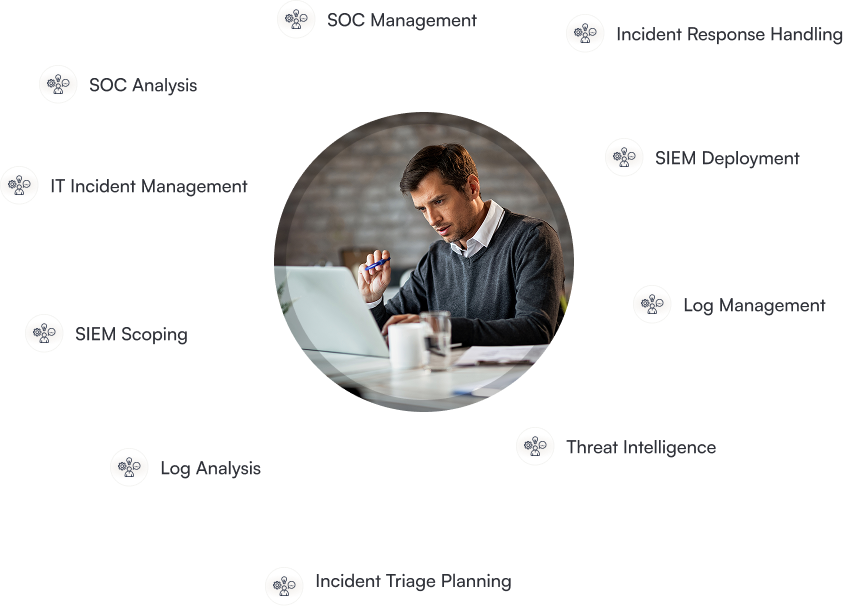AUDITING IT INFRASTRUCTURES FOR COMPLIANCE
10 Weeks
Duration
Online
Mode of Study
Certified SOC Analyst (CSA)
Certification
$465
Cost Per Credit Hour
Course Overview
This CSA course imparts the meticulous knowledge and technical skills to lead a SOC (Security Operations Center) team, enabling you to play a pivotal role in protecting your organization from cyber threats while remaining compliant with defined cybersecurity policies and regulations. You’ll gain advanced skills in managing various SOC processes like log management and correlation, SIEM deployment, advanced incident detection, incident response, and more.
Your career prospects and earning potential will be enhanced by upgrading your know-how of the latest SOC management trends, tools, and techniques. By earning the prestigious CSA certification, you’ll not only enhance your expertise but also elevate your credibility in the cybersecurity industry.


Admission Inquiry
"*" indicates required fields
Highlights of This Course

Cutting-Edge Courseware
10 modules featuring immersive video lectures and digital books for an in-depth understanding of every topic.

Virtual Labs
Simulate real-world scenarios for hands-on practice with the latest cybersecurity tools.

Quizzes
Engaging quizzes after each module that measure and reinforce your knowledge of the topics covered.

Discussions
Interactive discussion boards where you exchange ideas and views on the course topics with your peers and professors.

Essential Tools
Software tools that enhance your learning experience, such as Grammarly.

24x7 Online Library
Round-the-clock online library with an expansive collection of free-to-use learning resources.

Cybersecurity Certification
Includes EC-Council's industry-approved Certified SOC Analyst (CSA) certification.
Why Pursue a Career in SOC Management?
Market Growth
Soaring Demand
Earning Potential
Earning Potential
Weekly Modules
Week-1Module 1 – SOC Essentials
In this module, you’ll learn about the fundamentals of a Security Operations Center (SOC) and how it contributes to an organization’s cybersecurity management.
Week-2Module 2 – Cyberattacks, IOCs, and Incident Triage
This module teaches you different hacking methodologies, the working of various cyber-attacks and Indicators of Compromise (IoCs), and how to plan quick incident triage.
Week-3Module 3 – IT Incident Management and Log Analysis
In this module, you’ll examine IT incidents, events, logs, and log sources that generate logs. You will also learn about monitoring and analysis of logs in centralized logging.
Week-4Module 4 – Log Management for Threat Detection
This module explores the functionality of logging for detecting security threats, local logging, and centralized log management concepts.
Week-5Module 5 – SIEM Essentials: Scoping and Deployment
This module explains the importance of defining the scope, use cases, and requirements before SIEM deployment. You’ll also learn about various SIEM use cases and how to deploy SIEM in different scenarios.
Week-6Module 6 – Threat Intelligence Integration into SIEM
In this module, you’ll learn about how threat intelligence can be integrated seamlessly into SIEM, preparing you for some of the more complex topics you may encounter in this field.
Week-7Module 7 – Incident Response Process and SOC Analyst’s Role
In this module, you’ll explore the different stages of providing a systematic response to security incidents. You will learn about a SOC analyst’s role in incident response processes and how they escalate incidents from SOC.
Week-8Module 8 – Incident Response: Case Studies and Best Practices
This module dives deeper into the topics covered in the previous module. You’ll review research papers and learn about recent advancements in incident response processes.
Week-9Module 9 – Research Project
In this module, you’ll work on a research project designed to prepare you for the course’s final exam.
Week-10Module 10 – Final Exam
The final exam module will test your knowledge and understanding of all the topics covered throughout the course.
What You Will Learn

- Fundamentals of SOC processes and procedures
- SOC technologies and workflows
- Concepts of security threats, attacks, and vulnerabilities
- Insights into the behaviors of cyber-attackers
- Insights into the cyber kill chain
- How to monitor and analyze logs and alerts from various technologies across multiple platforms
- SIEM solutions
- SIEM deployment
- Concepts of threat intelligence and threat intelligence platforms (TIP)
- Integration of threat intelligence into SIEM
- Incident response processes
- How a well-managed SOC can facilitate better incident response
Virtual Lab Exercises

Get hands-on practice with state-of-the-art cybersecurity tools in simulations that mirror real-world scenarios with this CSA certification course. The virtual lab exercises included in this SOC Analyst certification course cover SOC management disciplines like understanding the working of SQL injection attacks, understanding the working of XSS attacks, understanding the working of brute force attacks, integrating IoCs into ELK Stack, generating tickets for incidents, containing data loss incidents, and much more.
Skills You Will Gain


- SOC Analysis
- SOC Management
- Incident Response Handling
- IT Incident Management
- SIEM Deployment
- SIEM Scoping
- Threat Intelligence
- Log Management
- Log Analysis
- Incident Triage Planning
Jobs You Can Prepare For
SOC Analyst
SOC Manager
Director of Security Operations/ SOC Director
SOC Administrator
IT Administrator
Incident Response Specialist
Incident Response Manager
SEIM Analyst
Threat Intelligence Analyst
Cybersecurity Engineer
SOC Consultant
Network Security Administrator
IT Security Auditor
Vulnerability Analyst
IT Compliance Analyst
IT Compliance Auditor
IT Compliance Manager
… And Many More!
Total Course Fee
$1,395
- Cost Per Credit Hour: $465
- Technology Fee Per Term: $50
- Transcript Fee: $10 (plus shipping, if international)

Admission Criteria
- You must be aged 18 years or older.
- You must have a high school diploma (or equivalent), college degree, or relevant certification.
How to Apply
Step 01 :
Fill out the NDS application form and submit it to our Enrollment Advisor.
Step 02 :
Send us a scanned copy of your official government identification and documents showing proof of education.
Step 03 :
Pay the one-time $100 application fee.
Voices of Success: Hear from Our Alumni
Here’s what our students say about this CSA certification course and how it helped advance their cybersecurity careers.

Frequently Asked Questions
Is the Certified SOC Analyst certification worth it?
The Certified SOC Analyst (CSA) certification is beneficial in the following ways:
- The CSA certification is industry-approved and recognized across the globe.
- The CSA certification trains you in essential SOC operations, including log management, SIEM deployment, incident detection, and response.
- A CSA certification can lead to career growth opportunities in higher-paying cyber security roles.
- Employers often look for certified professionals when hiring for specialized cyber security positions like SOC Analysts and SOC Managers.
Does the job of SOC Analyst require coding skills?
While coding skills are not mandatory for SOC (Security Operations Center) Analysts, they can be highly useful in simplifying various SOC-related tasks. EC-Council University’s Secure Programming non-degree course is ideal if you want to learn to create secure code.
What is the difference between CEH and CSA certifications?
The Certified Ethical Hacker (CEH) and Certified SOC Analyst (CSA) certifications are valuable cyber security certifications but focus on different areas and skill sets. CEH primarily focuses on ethical hacking and covers various related topics, such as network scanning, system hacking, malware threats, sniffing, social engineering, denial-of-service attacks, session hijacking, etc. On the other hand, CSA teaches the skills required to work in a Security Operations Center (SOC), covering topics such as log management and correlation, SIEM deployment, advanced incident detection, incident response, and more.
Both certifications offer unique career advantages and can complement one another, depending on your cyber security career goals.
